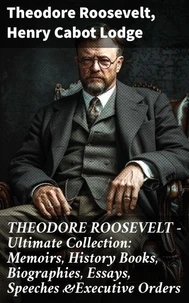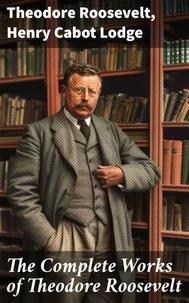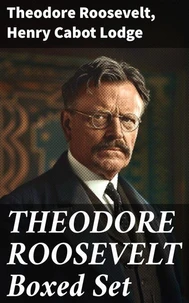African and European Addresses
Par :Formats :
Disponible dans votre compte client Decitre ou Furet du Nord dès validation de votre commande. Le format ePub est :
- Compatible avec une lecture sur My Vivlio (smartphone, tablette, ordinateur)
- Compatible avec une lecture sur liseuses Vivlio
- Pour les liseuses autres que Vivlio, vous devez utiliser le logiciel Adobe Digital Edition. Non compatible avec la lecture sur les liseuses Kindle, Remarkable et Sony
 , qui est-ce ?
, qui est-ce ?Notre partenaire de plateforme de lecture numérique où vous retrouverez l'ensemble de vos ebooks gratuitement
Pour en savoir plus sur nos ebooks, consultez notre aide en ligne ici
- Nombre de pages135
- FormatePub
- ISBN859-65--4737046-8
- EAN8596547370468
- Date de parution16/09/2022
- Protection num.Digital Watermarking
- Taille421 Ko
- Infos supplémentairesepub
- ÉditeurDIGICAT
Résumé
In "African and European Addresses, " Theodore Roosevelt offers a collection of speeches and writings that reflect his deep engagement with the global stage during the early 20th century. Through a rich tapestry of rhetoric inspired by both his travels and diplomatic encounters, Roosevelt employs a vigorous and assertive literary style that mirrors his dynamic personality and robust views on imperialism, international relations, and conservation.
These addresses not only illuminate the complexities of colonialism during this transformative period but also provide insights into Roosevelt's progressive beliefs about the responsibilities of nations and the interconnectedness of humanity. Theodore Roosevelt, the 26th President of the United States, was profoundly influenced by his experiences as a naturalist, soldier, and politician. His passions for exploration and diplomacy are evident throughout this work, driven by a belief in America's role on the world stage.
Roosevelt's tenure was marked by significant international and domestic challenges, including the frontier thesis and the establishment of national parks, shaping his perspectives on both nature and humanity's moral obligations. "African and European Addresses" is a valuable read for those interested in the intersections of history, politics, and environmentalism. Roosevelt's eloquent prose and prescient insights offer timeless reflections that encourage readers to consider the lasting impact of leadership on both national identity and global relationships.
These addresses not only illuminate the complexities of colonialism during this transformative period but also provide insights into Roosevelt's progressive beliefs about the responsibilities of nations and the interconnectedness of humanity. Theodore Roosevelt, the 26th President of the United States, was profoundly influenced by his experiences as a naturalist, soldier, and politician. His passions for exploration and diplomacy are evident throughout this work, driven by a belief in America's role on the world stage.
Roosevelt's tenure was marked by significant international and domestic challenges, including the frontier thesis and the establishment of national parks, shaping his perspectives on both nature and humanity's moral obligations. "African and European Addresses" is a valuable read for those interested in the intersections of history, politics, and environmentalism. Roosevelt's eloquent prose and prescient insights offer timeless reflections that encourage readers to consider the lasting impact of leadership on both national identity and global relationships.
In "African and European Addresses, " Theodore Roosevelt offers a collection of speeches and writings that reflect his deep engagement with the global stage during the early 20th century. Through a rich tapestry of rhetoric inspired by both his travels and diplomatic encounters, Roosevelt employs a vigorous and assertive literary style that mirrors his dynamic personality and robust views on imperialism, international relations, and conservation.
These addresses not only illuminate the complexities of colonialism during this transformative period but also provide insights into Roosevelt's progressive beliefs about the responsibilities of nations and the interconnectedness of humanity. Theodore Roosevelt, the 26th President of the United States, was profoundly influenced by his experiences as a naturalist, soldier, and politician. His passions for exploration and diplomacy are evident throughout this work, driven by a belief in America's role on the world stage.
Roosevelt's tenure was marked by significant international and domestic challenges, including the frontier thesis and the establishment of national parks, shaping his perspectives on both nature and humanity's moral obligations. "African and European Addresses" is a valuable read for those interested in the intersections of history, politics, and environmentalism. Roosevelt's eloquent prose and prescient insights offer timeless reflections that encourage readers to consider the lasting impact of leadership on both national identity and global relationships.
These addresses not only illuminate the complexities of colonialism during this transformative period but also provide insights into Roosevelt's progressive beliefs about the responsibilities of nations and the interconnectedness of humanity. Theodore Roosevelt, the 26th President of the United States, was profoundly influenced by his experiences as a naturalist, soldier, and politician. His passions for exploration and diplomacy are evident throughout this work, driven by a belief in America's role on the world stage.
Roosevelt's tenure was marked by significant international and domestic challenges, including the frontier thesis and the establishment of national parks, shaping his perspectives on both nature and humanity's moral obligations. "African and European Addresses" is a valuable read for those interested in the intersections of history, politics, and environmentalism. Roosevelt's eloquent prose and prescient insights offer timeless reflections that encourage readers to consider the lasting impact of leadership on both national identity and global relationships.







